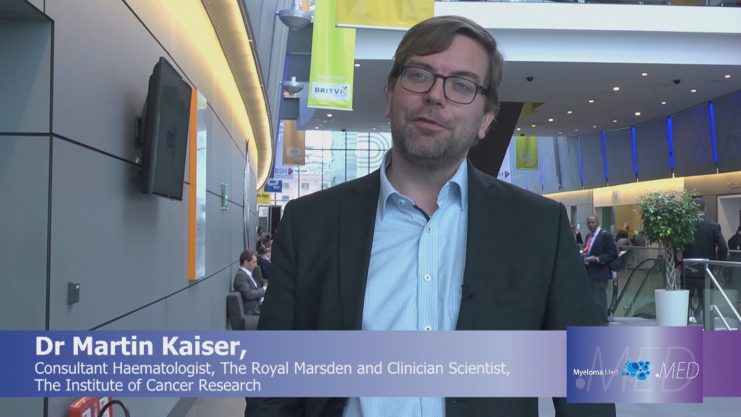Advertisment
BSH 2018: Stratified medicine – using genomic analysis to deliver therapy in high-risk myeloma

Dr Martin Kaiser (London) discusses recent work from the UK on identifying robust markers and how clinical decisions can be made according to the biology of the disease.
Advances in the management of multiple myeloma (MM) in recent years have drastically improved survival compared with 40-50 years ago. However, unlike other haematological cancers such as HL and DLBCL, MM remains incurable with a high likelihood of relapse and death…
Article by Maria Dalby. Interviews by Esther Drain.
Dr Martin Kaiser (Consultant Haematologist, The Royal Marsden and Clinician Scientist, The Institute of Cancer Research)
Advances in the management of multiple myeloma (MM) in recent years have drastically improved survival compared with 40-50 years ago. However, unlike other haematological cancers such as Hodgkin lymphoma and diffuse large b-cell lymphoma, MM remains incurable with a high likelihood of relapse and death.1 In the first session at the UK Myeloma Forum, Dr Martin Kaiser from London argued that upfront multiple molecular genetic profiling will make it possible to identify patients with high-risk MM who are likely to relapse early, and initiate pre-emptive interventions with combination drug therapy based on multiple mechanisms of action.
Understanding the disease biology constitutes an important focus in MM research. The hope is that gaining insights into the genetics and epigenetics of MM and how these affect long-term outcomes will provide targets for stratification and intervention. This includes better understanding of early events and how these drive disease progression. Studies in renal cell carcinoma have suggested that the first genomic aberrations may appear many decades before the disease is diagnosed,2 and although MM probably represents a more complex process, understanding the link between structural aberrations and disease evolution will be key to adopting a stratified approach.
In a recently published meta-analysis, molecular profiling data was linked with survival outcomes in 1,905 patients with newly-diagnosed MM included in the Myeloma IX and XI studies.3 This analysis confirmed a significant adverse prognostic impact on OS of t(4;14) (HR 1.60; p=4.77×10-7), t(14;16) (HR 1.74; p=0.0005), t(14;20) (HR 1.90; p=0.00897), del(17p) (HR 2.10; p=8.86×10-14), and gain(1q21) (HR 1.68; p=2.18×10-18). Patients with two or more adverse lesions – so-called ‘double-hit’ MM – had an overall OS HR of 2.67 (p=8.13×10-27). The investigators stressed that the molecular profiling tools used in this analysis are readily available and should be part of an effort to implement stratified treatment approaches in routine practice.
Multiple mechanisms of action will need to be combined to stand a chance of overcoming molecular high-risk MM. Myeloma UK have recently launched the MUK nine study programme, with Dr Kaiser as principal investigator. In MUK nine patients with newly-diagnosed MM will undergo genetic screening at inclusion, and patients identified as having high-risk MM will be included in a phase 2 single-arm multi-centre study involving a penta-therapy induction protocol of bortezomib, lenalidomide, daratumumab, cyclophosphamide, and dexamethasone, followed by autologous stem cell transplantation, bortezomib/lenalidomide/daratumumab consolidation and lenalidomide/daratumumab maintenance therapy. Up to 700 patients will be screened with a view to including 95 patients in the phase 2 trial. The primary endpoint will be PFS at 18 months post-registration. Patients with non-high-risk disease will receive standard therapy and will be followed up as a cohort to assess response and survival. MUK nine will be is one of the first studies in the world to have high-risk patients as its primary focus.
References
- Kumar SK, Dispenzieri A, Lacy MQ, et al. Continued improvement in survival in multiple myeloma: changes in early mortality and outcomes in older patients. Leukemia 2014;28:1122-8.
- Mitchell TJ, Turajlic S, Rowan A, et al. Timing the Landmark Events in the Evolution of Clear Cell Renal Cell Cancer: TRACERx Renal. Cell 2018;173:611-623 e17.
- Shah V, Sherborne AL, Walker BA, et al. Prediction of outcome in newly diagnosed myeloma: a meta-analysis of the molecular profiles of 1905 trial patients. Leukemia 2018;32:102-110.





